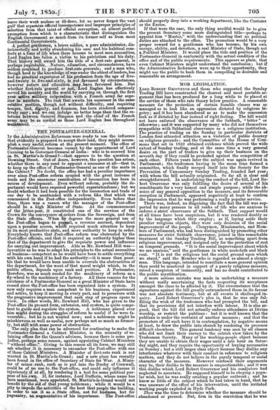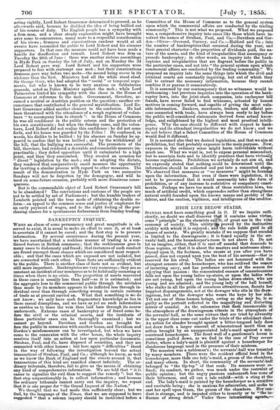MOB LEGISLATION.
LORD ROBERT GROSVFNOR and those who supported the Sunday Trading Bill have constructed the clearest and most portable ar- gument that has been produced for a long while to be placed at the Bereft* of those who rate theory below practice. A reasonable measure for the protection of certain humble classes was so managed as to look like an oppression dictated by religious bi- gotry; and it has been abandoned so as to make the concession look as if dictated by fear instead of right feeling. The bill would not have enforced the observance of the Sabbath, " bitter " or otherwise ; and it was supported by many who did not themselves sympathize with Sabbatical observance as a religions institution. The practice of trading on the Sunday in particular districts of London first attracted attention as a violation of public decency on religious grounds ; and the Committee of the House of Com- mons that sat in 1832 obtained evidence which proved the wide extent of Sunday trading, and at the same time a very general desire on the part of traders to give up their business on the seventh day if they could be protected against the competition of each other. Fifteen years later the subject was again revived in Parliament ; the tradesmen having in the mean time formed a committee, which finally merged itself into the Society for the Prevention of Unnecessary Sunday Trading, founded last year; with whom the bill actually originated. So far all is clear and straightforward. In undertaking the conduct of the bill, Lord Ro- bert Grosvenor was only fulfilling the desire of several of his constituents for a very honest and simple purpose ; while the ab- sence of any general opposition to the measure, and its favourable" reception in Parliament, appeared negatively at least to confirm the impression that he was performing a really popular servioe. There was, indeed, no disguising the fact that the bill was sup- ported by many persons in all ranks of life who are anxious to enforce a strict observance of the Sabbath. That support would at all times have been suspicious, but it was rendered doubly so by the language which they employ ; as if, laying aside their peculiar religious objects they were only desirous of the social improvement of the people. Clergymen, Missionaries, and Mem- bers of Parliament, who had been distinguished by promoting other measures for strict Sabbath observance joined in this remarkable treatment of the Sunday Trading Bill, as something apart from religious improvement, and designed only for the protection of rest on temporal grounds. "It is the social improvement about which we are anxious," said the gentleman in white neckcloth and black coat. "It is not the religious but the social ground upon which we stand," said the Member who is regarded as almost a clergy- man. This language, intended to conciliate a more general opinion than could be mustered in support of a purely religious measure, raised a suspicion of insincerity, and has no doubt contributed to the public mystification. A more serious mistake was made in undertaking a measure without really ascertaining the facts respecting its acceptance amongst the class to be affected by it. The circumstance that the signatures against the bill greatly outnumbered those in its favour was not absolute testimony, but at all events it challenged in- quiry. Lord Robert Grosvenor's plea is, that he was only ful- filling the wish of the tradesmen who had prompted the bill and that its provisions did not interfere with labour. It is also ar- gued, that the bill did not actually enforce attendance at Divine worship, or restrict the publican: but it is well known that the publican is under the restraint of another measure; and that the promoters of all such have it in contemplation, by. negative means at least, to draw the public into church by rendering its presence difficult elsewhere. This general tendency was seen by all classes who did not limit their survey to the ostrich view taken by the Tradesman Society. Many of the working-people object because they are unable to obtain their wages until a late hour on Satur- day night, and they require the opportunity of buying necessaries on Sunday ; but a still larger class object because they dislike any interference whatever with their conduct in reference to religious matters, and they do not believe in the purely temporal or social character of the measure. However confused their arguments may be, their dislike to the measure is unquestionable ; and it was this dislike which Lord Robert Grosvenor and his coadjutors had neglected to ascertain. He supposed himself to be obeying a popu- lar wish, but he was really creating a popular outbreak ; and he knew so little of the subject which he had taken in hand, that he was unaware of the effect of his intervention, until the irritated working people exploded in Hyde Park. Then was the time to determine whether the measure should be abandoned or pressed. But, firm in the conviction that he was
acting rightly, Lord Robert Grosvenor determined to proceed, as he afterwards said, because he disliked the idea of being bullied out of his course of duty. The English people has a sympathy with a firm man, and a clear steady explanation might have brought over some to concurrence, many more to a respectful consideration of his views ; firmness and conscientious candour would at all events have reconciled the public to Lord Robert and his sincerer supporters. In that case the measure could not have been made a handle for disaffection and tumult. Lord Robert was firm op Tuesday the 26th of June : there was another riotous assemblage in Hyde Park on Sunday the let of July, and on Monday the 2d Lord Robert gave way. Lord Robert and his supporters were prepared to face with contempt one mob ; but their conscientious firmness gave way before two mobs—the second being worse in its violence than the first. Ministers had all the while stood aloof. Sir George Grey, who had adopted the " social " or temporal argu- ments, but who is known to be very anxious on Sabbatazian grounds, acted as Police Minister against the mob ; while Lord Palmerston hinted his sympathy with the cheer in the House of Commons at reference to the mob. Government, therefore, as- sumed a neutral or Austrian position on the question ; another cir- cumstance that contributed to the general mystification. Lord Ro- bert Grosvenor added another element to the confusion. He had been threatened with the attendance of a rough regiment of volun- teers "to accompany him to church ": in the House of Commons he was all confidence in the public esteem and the protection of his own constituents ; but when the Sunday came, and the volun- teers, Lord Robert did not realize this confidence : he did not come forth, and his house was guarded by the Police He confessed, in words, his dislike to be bullied : by his absence on Sunday he ap- peared to confess that he was bullied ; and by the withdrawal of the bill, that the bullying was successful. The promoters of the bill, therefore, had rendered a desirable and reasonable measure im- practicable; they defied opposition until it culminated to a high point, and then they succumbed. They created an occasion for " direct " legislation by the mob ; and in adopting the dictate, they rendered that comparatively small measure the opportunity for inviting a similar process with regard to other measures. The result of the demonstration in Hyde Park on two successive Sundays will not be forgotten by the demagogue, and will be used on some future occasion, probably with more disastrous conse- quences. But is the commendable object of Lord Robert Grosvenor's bill to be abandoned ? The convictions and customs of the people are not to be settled by act of Parliament; but the humble traders of Lambeth pointed out the true mode of obtaining the double re- form—an appeal to the common sense and justice of employers for an early payment of wages, and to the right feeling of the pur- chasing classes for a spontaneous forbearance from Sunday trading.



























 Previous page
Previous page